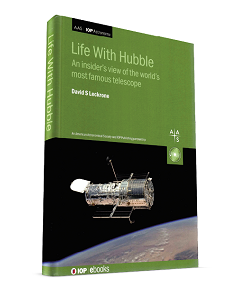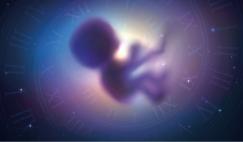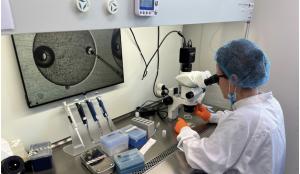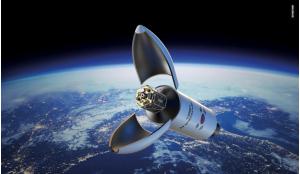The old adage “you can’t judge a book by its cover” rings true for this volume on the Hubble Space Telescope: its size, weight and cover design suggest a university text replete with charts and equations, but nothing could be further from the truth. It is, in fact, as the subtitle attests, “An insider’s view of the world’s most famous telescope” and is illustrated predominantly with colour photos.
The book is authored by a NASA astrophysicist who held several Hubble leadership positions, including senior project scientist, spanning more than three decades, which places him in prime position as “narrator” of this “Hubble Family memoir”, as he puts it. Quite rightly, he finds it frustrating that so many Hubble articles and documentaries focus on the telescope’s early ‘lack of focus’ due to the incorrect manufacture of its primary mirror: “the saga of spherical aberration came to an end 26 years ago!”, he complains. Naturally, however, he can’t resist covering it again in chapter one.
The following 20 chapters tackle the Shuttle servicing missions and the correction of the aberration, but finally move on to catalogue some of the telescope’s contributions to research into comets, black holes, quasars and the extent of the universe. The book is based on the author’s own recollections as well as on a couple of dozen interviews with “fellow scientists, engineers, astronauts, and managers”.
The author interposes scientific discovery with personal contributions and other human interest stories. Thus we learn of Milton Humason’s contribution to astronomy with the 100 inch Hooker telescope on Mount Wilson in California. He began by “driving mule trains up the mountain, carrying supplies to the construction site”, got hired as a janitor at the new observatory, volunteered as a “night assistant” and eventually caught the attention of George Ellery Hale, the observatory’s founder. Hale promoted the “poorly educated man” to permanent staff and Humason went on to develop techniques to photograph the spectra of very faint objects. Indeed, so instrumental was he in providing data for what became known as Hubble’s Law that the author considers it appropriate to call it the Hubble-Humason Law. Not bad for a mule-driver turned janitor!
Pointing to the “large population of people” with a fascination for the venerable Hubble Space Telescope, the author dedicates his book “to all the Hubble Huggers of the world”. These ‘huggers’ will find much of interest in this book, but the author’s frustration with those Hubble documentaries will pale into insignificance against that of his target audience when they discover that he chose not to grace the book with an index! Given the wealth of information and anecdote contained within its pages, this is an absolutely unforgivable omission as it renders much of that information irretrievable.
And whoever decided that it was a good idea to number the chapters individually, resetting the counter to ‘1’ with each new section, needs their head examined. My thanks to the Barnes & Noble website for providing a total page-count for my review header – I certainly couldn’t be bothered to count them all up!











